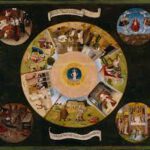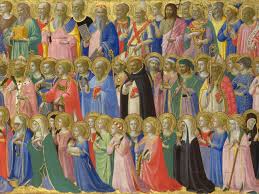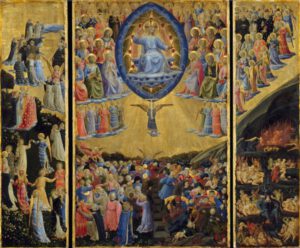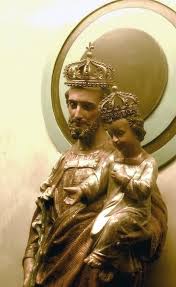“In all thy works remember thy last end, and thou shalt never sin.”
(Ecclesiasticus, 7:40)
When we lose a loved one, our hearts ache and a great unease pains our sense. Wrestle how we might, we come to accept the reality only after we have decided, like Keats in ‘Ode to a Nightingale’, that to them ‘now more than ever seem[ed] it rich to die, to cease upon the midnight with no pain’. Eventually, we gratefully recognize that history had been unfolding before our very eyes through God’s infinite wisdom, mercy and goodness. Peace descends on us and the former unease turns into a wish simply to remain spiritually united with the departed soul.

Taking in the inexorable mystery of death – and, specifically, the passing away of a near and dear one – is an important milestone in our lives. Helen Keller once said apropos the proper use of the physical senses: “Sometimes I have thought it would be an excellent rule to live each day as if we should die tomorrow. Such an attitude would emphasize sharply the values of life. We should live each day with a gentleness, a vigour, and a keenness of appreciation which are often lost when time stretches before us in the constant panorama of more days and months and years to come. There are those, of course, who would adopt the Epicurean motto of ‘Eat, drink, and be merry’, but most people would be chastened by the certainty of impending death.”
Many of us would also wish to gaze beyond our earthly life, seeking to understand what is to become of us after death. And should we wonder why we are born at all if we are to die some day, we will realize that there is more to life than just this earth. It requires only that leap of faith to see that, like matter, the soul changes its form but is never destroyed; that life returns to where it has come from: the bosom of the Lord!
Communion of Saints
Catholic doctrine has comforting answers to the eternal questions of Life and Death: it would be of immense spiritual profit if we learnt them in time, so that whether or not we gain this whole, wide world, we might be poised to earn the next!
The Catechism of the Catholic Church (CCC) teaches us that, living or dead, when in a state of grace we live in Christ as ‘saints’; that there is the church of heaven and of earth, where the saints live in communion with each other and with God, much in the manner of the Triune God!
The CCC emphatically says, “What is the Church if not the assembly of all the saints? The communion of saints is the Church,”[1] and goes on to explain that the term has two closely-linked meanings: communion in holy things and in holy persons.[2]

The communion in holy things or spiritual goods comprises (1) the faith received from the apostles and kept alive through prayer; (2) the sacraments, most importantly the Eucharist; (3) the charisms, or graces that the Holy Spirit distributes among the faithful for building up of the Church; (4) our possessions, which are, really speaking, the Lord’s goods under our stewardship; and, finally, (5) love, whereby if one member suffers, all suffer together; if one member is honoured, all rejoice together.
The communion in holy persons refers to the life that the saints of heaven and earth live in common. While some of Christ’s disciples are still pilgrims on earth, others have died and are being purified; yet others are already in glory, contemplating God in full light. The exchange of spiritual goods, while it helps the departed to attain the Beatific Vision, also makes their intercession for us effective. Finally, being more closely united to Christ, they fix the whole Church more firmly in holiness.
In his book True Spiritualism, Fr. C. M. de Heredia, S.J., calls the Communion of Saints “a Divine Corporation, a great communism in which all the saints in heaven and all the souls in purgatory and all the children of the Church on earth form one vast family, of which Christ is the head, and participate in all spiritual goods that are in common.” The early Christians in Jerusalem “had but one heart and soul; neither did any one of them say that, of the things which he possessed, anything was his own; but all things were common to them. […] And those who had houses and lands sold them and laid the price at the feet of the Apostles who distributed them to every one according to their needs.” (Acts 4: 32, 34) The Communion of Saints is this same idea “raised to the heavenly sphere, embracing both planes of existence, enveloping the finite world and entering into the infinite, the idea that makes common property not so much of earthly as spiritual goods.”[3]
Vocation of the Church

The CCC says, “If we continue to love one another and to join in praising the Most Holy Trinity – all of us who are sons of God and form one family in Christ – we will be faithful to the deepest vocation of the Church.”[4]
What is the deepest vocation of the members of the Church? It is to know God, love Him and serve Him. So it behoves us to learn how to do all these things! We should (re-)arrange our worldly priorities so that God becomes the centre of our lives and is forever praised in all that we do. On balance, this is what holds out the eternal reward after our life in this valley of tears!
“It has been alleged oftentimes,” says De Heredia, “that the Church has taught that in this world there is nothing but misery, and that she is not for this life but for the next. Well do we know how erroneous that is! As the soul is greater than the body even in this life, so does it follow that the pleasures of that soul are greater than the pleasures of the body. It is the Church which teaches us how to be happiest in this life and happiest in the next. The philosophy that reduces the world’s playthings to their proper perspective and makes man at once great in the accomplishments of earth and at the same time divinely indifferent to them is hers. [….] No hedonist, no aesthete, however rapturous his pagan worship of beauty, can equal the Catholic even in pursuit of earthly happiness.
“But immeasurably beyond these sources of joy, the Catholic has his firm hope in the everlasting happiness of heaven. He has his trust in a God who loved man so much that He came to earth and died for him. The light of Paradise is in his eyes. The beauty of God illuminates his soul. The caresses of his Heavenly Father are on him. And he has his belief in the power and companionship of the Communion of Saints.”[5]
Last Things First!
The communion of saints is a marvellous reality.[6] But this can be fully appreciated only against the background of eschatology, the teaching about the ‘Four Last Things’: death, judgement, heaven and hell. These apply to the individual, while the resurrection of the bodies and the final judgement at the second coming of Christ are for the human race as a whole.
Knowledge about the ‘Last Things’ is best not left for the last moment (as St Francis of Assisi says, “We shall die sooner than we expect”). We are duty-bound to see that the ‘communion of saints’, ‘the forgiveness of sins’, ‘the resurrection of the body’, and ‘the life everlasting’ from the ‘I Believe’ are not mere words but operating realities! We must understand that the ‘hour of death’ that the ‘Hail Mary’ reminds us of is not just another moment in a distant, even undefined, future but could come sooner than later! And we who recite the ‘Our Father’ and assist at Mass would do well to learn what is meant by the ‘Kingdom’ and ‘Eternal Life’! Such fundamentals of our faith have to be transferred from the tomes of theology to the homes of everybody – meditated upon, discussed, internalized, and acknowledged in our daily life. Or even a prayer, like the following one to St Joseph, composed by none other than Pope Pius X, points to the true worth of those concepts.
O Glorious St. Joseph, a model for all who are devoted to labour, obtain for me the grace to work in a spirit of penance, for expiation of my ma ny sins; to work conscientiously, putting the call of duty above my inclinations; to work in recollection and joy, deeming it an honour to employ and develop through labour the gifts received from God; to work with order, peace, moderation, and patience, never shrinking out of weariness and trials; to work, above all, with purity of intention and with self-detachment, having ever before my eyes death and the account that I will have to render of time lost, talents wasted, good omitted, and vain complacency in success, so baneful to God’s work.
ny sins; to work conscientiously, putting the call of duty above my inclinations; to work in recollection and joy, deeming it an honour to employ and develop through labour the gifts received from God; to work with order, peace, moderation, and patience, never shrinking out of weariness and trials; to work, above all, with purity of intention and with self-detachment, having ever before my eyes death and the account that I will have to render of time lost, talents wasted, good omitted, and vain complacency in success, so baneful to God’s work.
All for Jesus, all through Mary; all after thy example, O Patriarch St Joseph! This will be my watchword in life and in death. Amen.
This is eschatology made simple… eschatology in action! We are gently reminded that this world and the next are seamlessly woven into one whole; that what we do now – and how we live and work – determines our later fate.
It is easy to see that the Last Things are relevant not only to the afterlife but also immensely so to our present life. By letting us realize our final end, they bring about the required change in our worldview. They determine our dreams and aspirations as well as our response to earthly trials and temptations; they shape the nature of our hope and our way of life. They teach us why it is natural to seek first the kingdom of God and its justice; and how to be in the world and not of it.
It is surprising that we Catholics seldom talk actively about the Last Things. It is as though a conspiracy of silence is militating against our understanding them fully, thus even giving Eternal Life a semblance of fiction. Alas, we fail to realize that, by ignoring this real important aspect of our Christian existence, we let pessimism and despair cloud our consciousness. This is truly asphyxiating for the Catholic soul.
On the other hand, the greater our engagement with the Last Things the better it is for God’s people. A culture of hope and consolation is fostered, lending that much-needed supernatural quality to our being. We begin to live an integrated Catholic life. The communion of saints in heaven and earth is made active, and the Kingdom comes…. All good enough reasons to put the Last Things first!
(Renovação/Renewal, Goa, 16-31 August 2011)
[1] CCC 946
[2] The communion of saints is not linked to ‘spiritism’ (contact with the dead), which is disallowed by the Church.
[3] C. M. de Heredia, True Spiritualism, P. J. Kenedy & Sons, New York, 1924, p. 9-10
[4] CCC 959
[5] Op. cit., p. 28-29
[6] Whoever doubts this may refer to a simple little book, Read me or Rue it, by Fr. Paul O’Sullivan, O.P., TAN Books, 1992 (First published in 1936, with approval from His Eminence the Cardinal Patriarch of Lisbon): It carries captivating true stories about the Poor Souls in Purgatory.
Thank you for this timely article, on All Saints’ Day and the eve of All Souls’ Day. Provides plenty of food for reflection.
Thank you Mr. Oscar for this wonderful article. Good points for a meditation.